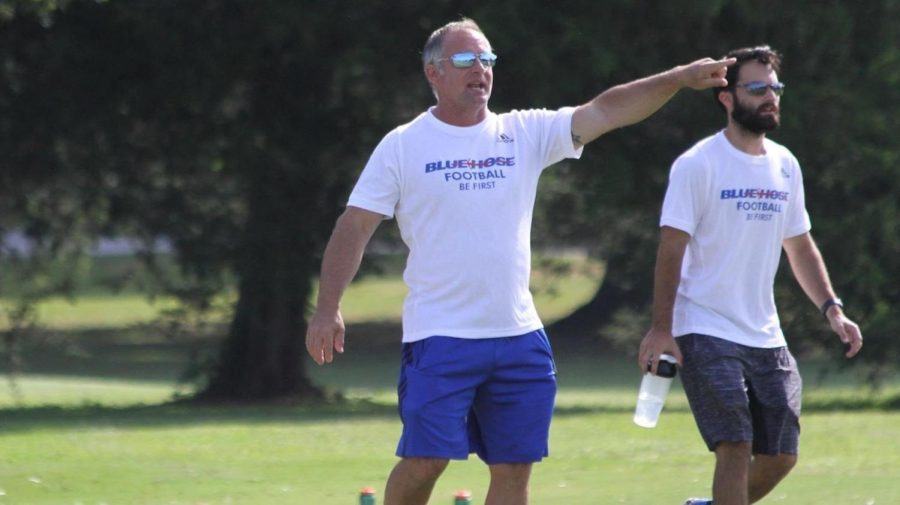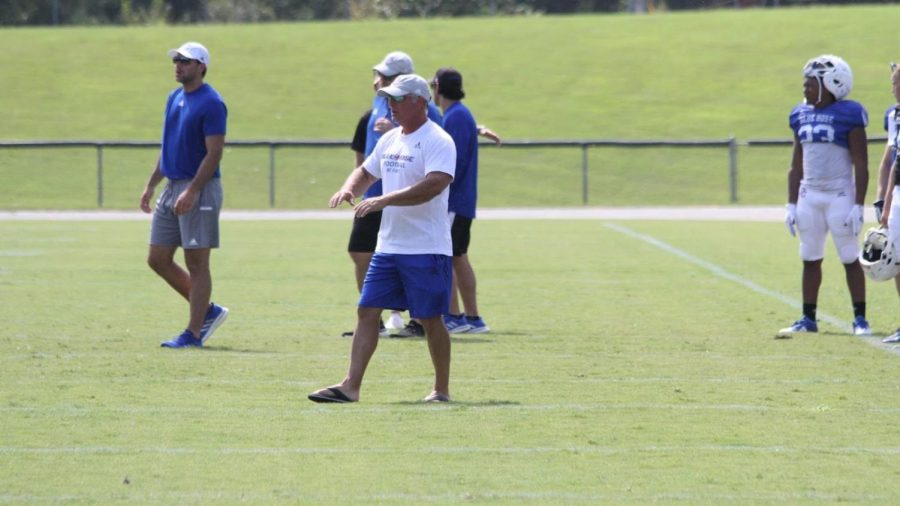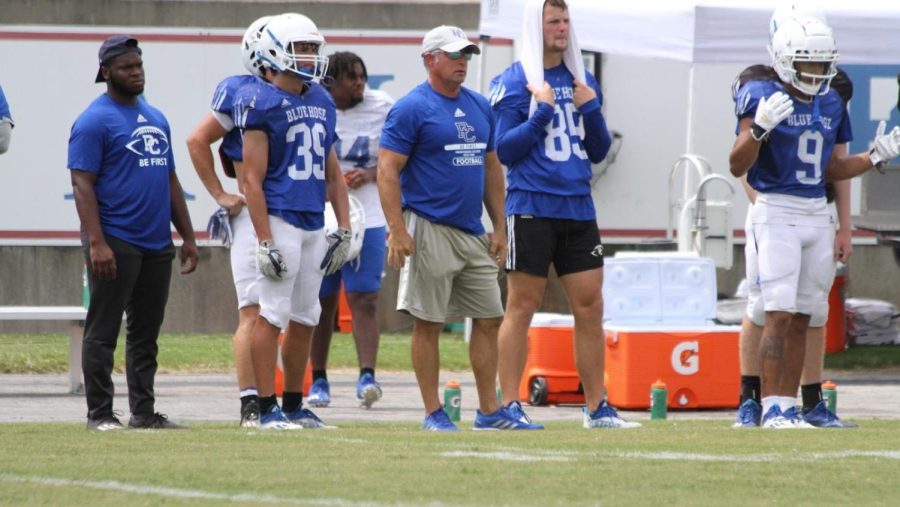Exclusive With Blue Hose Football Coach Kevin Kelley
October 21, 2021
The game of football can mean a whole lot to people who either participate in it or watch it for sport. Football is more than a game between two teams who compete against each other on a playing field; it opens the door for scholarships, life lessons, mentors, lifelong friendships and more.
For Presbyterian College Head Football Coach Kevin Kelley, the game of football means the world to him.
Currently in his first season as the Blue Hose head coach, Kelley never thought he would be in a position to lead a Division I college football program or earn many successes during his day as a high school football coach at Pulaski Academy in Little Rock, Arkansas. In his previous position, Kelley won nine AAA Championships and became known to many as “the coach who never punts.”
Kelley was born in Arkansas, and that’s how he landed the job at Pulaski Academy. However, he admits that getting to where he is today has not been an easy task. Family issues and tough financial situations hit Kelley’s family hard.
“Growing up, I was a part of the classic split-childhood. My mom and dad divorced early. At that time, I had one sister until I was 11 and I had another one after that. Growing up, it was the classic story of a split mom and dad, not having much money, that kind of stuff,” Kelley said.
Surprisingly, he found the one thing he needed to escape from these challenges and adversity in Dallas Cowboys football on Sunday afternoons.
“I remember waiting on Sundays when I was three because in Arkansas, the NFL starts at noon and we got the regional [Dallas] Cowboys games. I remember watching the Cowboys play. So I started loving that because it was a distraction from what life was,” Kelley said.
The Cowboys, also known as “America’s Team”, appeared in five Super Bowls in the 1970s, winning two championships. This decade of the Cowboys franchise had a number of its players and coaches enter the Pro Football Hall of Fame from those teams.
Some of the notable figures from those 70s Cowboys teams included head coach Tom Landry, quarterback Roger Staubach, running back Tony Dorsett, receiver Drew Pearson, defensive tackle Randy White, safety Cliff Harris, and more.
Because of his love for the Cowboys, Kelley began his football career and played up to the high school ranks. Following his playing days, Kelley went to college and earned a Bachelor of Science degree in education with a Biology certificate. But after witnessing a few friends in college get into the coaching ranks, he decided that he wanted to give coaching a shot.
Kelley then coached in the Dallas area, home to a number of highly touted Texas high school football programs. Even though the high school he was at had four different coaches in five years, the current Blue Hose coach was also known for his strong passing attack on the offensive side of football.
Because of his success in the passing game, Kelley then had the opportunity to coach in Arkansas. The decision to coach at Pulaski Academy changed the course of his life in unexpected ways.
“The reason why I left is because I got a call from Pulaski Academy in Arkansas and they saw who I was under and what we were doing offensively. We were throwing the ball down there in the 90s in which nobody was doing much and the guy at Pulaski Academy wanted to throw the ball. The actual superintendent wanted to throw the ball. So that’s what led me to Arkansas,” Kelley said.
After starting out as an offensive coordinator, Kelley was then promoted to head coach and his unique coaching style was born – no punts, two-point conversions after touchdowns, and onside kicks. The result was the following: nine state championships, USA TODAY High School Coach of the Year, recognition from New England Patriots coach Bill Belichick, a three hour YouTube film showcasing Pulaski, and many more accomplishments.
Reflecting on his time at the small private school, Kelley was really proud that players trusted in his unique style of coaching, but he was even more proud of the men they went on to become.
“I really think with the way we play the game, that it’s okay to think differently about things… [I’m] really proud of the number of people that have played for me and gone on to be doctors, attorneys, firemen, and policemen. I had all of that,” Kelley said. “When you look and see that all of those guys played under me, that’s probably my favorite thing, and keeping those relationships [open] when guys are long gone.”
Despite the challenges of leaving a program and a state that he loves, Kelley has always had an interest in coaching the college ranks. After interviewing for many coaching positions at Division I schools of varying sizes, Kelley decided to bring his talents to PC after noticing similarities between our campus and Pulaski Academy.
“What attracted me to this place [Presbyterian College] is when I came down for a visit, the culture was the same. It was the same type of nice people, southern hospitality, that kind of thing. We were used to that and I thought my family would be comfortable in that mood,” Kelley said. “There was also a history of good football and you know that they value it here. I think it’s important you have a place that values football… I wanted to do what I believe was the best thing – to decide each individual play in football and the way we wanted to run it, and that was attractive to me.”
With the exception of speaking at different events and meeting with a lot of PC alumni, the transition from high school to the college ranks hasn’t been a challenge for the first year head coach. Even with a young roster and more mature players, Kelley knows that football is football and athletes can play in any system no matter what their age or class might be.
In terms of recruiting, the Blue Hose coach knows how important the state of South Carolina and surrounding areas are in helping turn PC back into a quality football program. With nearby Clinton High School being one of the favorites to win a 3A state championship and Laurens High School producing Division I players each year, Kelley says that it must start with keeping those players in Laurens County.
“You want to build your program with the kids closest to your college because that’s your surrounding support and they are going to be at your games. Kids are going to play harder for them. If it’s going well, then people will come further and further away and the team loves having people in the stands,” Kelley said. “I believe that kids play harder for their in-state schools. I think that you start from the closest and build out from there and there’s great football in South Carolina.”
After coming from a competitive football region in Arkansas, Kelley was afraid that South Carolina wouldn’t measure up to the talent. However, he has since come to realize that South Carolina has a plethora of talented athletes who are ideal candidates for recruitment; and his main goal for recruiting is to commit in-state players first.
“I thought there was good football in Arkansas and its surrounding areas, but South Carolina is the same way. Between South Carolina with it’s upstate region down towards the coast, there’s some great football and some really good football players. That’s always going to be the vast majority as long as I am here trying to build with those guys first. Then, you got to get guys from North Carolina, Georgia, and Florida because they are close and still accessible. But the nucleus has to start with South Carolina,” Kelley said.
On the football field, PC is currently 2-3 and after scoring a combined 152 points in the first two contests, the Blue Hose have lost their last three games, which included a blowout loss to Campbell 72-0.
Despite the ups and downs this season, Kelley is pleased with how key players on offense and defense have stepped up this year.
“On defense, Evan Murphy, Jarett Nagy, and Tyrese Moses were all elected captains by their team and it’s odd because they are all linebackers. Those were the guys on defense who were the captains and have done a great job on the field and a good job off the field,” Kelley said. “People underestimate the job you need off the field.”
Although most of the action seems to take place on the field, Kelley encourages his supporters to consider the work his players are able to accomplish off the field. Despite losing one of his key players, Kelley is proud of the work his team has been able to do so far.
“On offense, we have Tyler Huff, Ren Hefley, and Kiaran Turner. Kiaran is a receiver and the other two are quarterbacks and you could see before Tyler’s season ending surgery he’s having, he was a big part of our offense even though he’s not our starting quarterback. It hurt us when we lost him, but he’s done a great job leading the team and being a captain of the team before and after that,” Kelley said.
Moving forward, Kelley wants his players to get involved with the community to learn valuable lessons that will stay with them after their football days are over.
“One of our goals for the program is to turnout great people that are going to come back, give to the school, give to the community, serve the community and those kinds of things. I think if we do that on a daily basis with some of the things we are doing as coaches to set examples,” Kelley said. “I think the players don’t realize it, but by asking them to push a little harder a game, it’s going to teach them to push a little harder as family members, as workers when they get their real jobs. I think it’s important too to teach life lessons that will carry them beyond the game of football.”
However, the most important goal to coach Kelley is the obvious: build a winning program in Clinton and bring PC to heights that the school has never seen before.
“The main goal should be to compete for playoff spots, conference championships, and even a national championship, and that’s our long term goal. I want people to know what PC is for the way we play football on the field and how hard we play for good football,” Kelley said. “I think if you do that and you make your guys think that’s a believable goal, then we have a real shot to do it year after year.”







